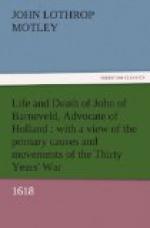Two days afterwards Barneveld made his appearance at the apartments of the Stadholder. The two great men on whom the fabric of the Republic had so long rested stood face to face once more.
The Advocate, with long grey beard and stern blue eye, haggard with illness and anxiety, tall but bent with age, leaning on his staff and wrapped in black velvet cloak—an imposing magisterial figure; the florid, plethoric Prince in brown doublet, big russet boots, narrow ruff, and shabby felt hat with its string of diamonds, with hand clutched on swordhilt, and eyes full of angry menace, the very type of the high-born, imperious soldier—thus they surveyed each other as men, once friends, between whom a gulf had opened.
Barneveld sought to convince the Prince that in the proceedings at Utrecht, founded as they were on strict adherence to the laws and traditions of the Provinces, no disrespect had been intended to him, no invasion of his constitutional rights, and that on his part his lifelong devotion to the House of Nassau had suffered no change. He repeated his usual incontrovertible arguments against the Synod, as illegal and directly tending to subject the magistracy to the priesthood, a course of things which eight-and-twenty years before had nearly brought destruction on the country and led both the Prince and himself to captivity in a foreign land.
The Prince sternly replied in very few words that the National Synod was a settled matter, that he would never draw back from his position, and could not do so without singular disservice to the country and to his own disreputation. He expressed his displeasure at the particular oath exacted from the Waartgelders. It diminished his lawful authority and the respect due to him, and might be used per indirectum to the oppression of those of the religion which he had sworn to maintain. His brow grew black when he spoke of the proceedings at Utrecht, which he denounced as a conspiracy against his own person and the constitution of the country.
Barneveld used in vain the powers of argument by which he had guided kings and republics, cabinets and assemblies, during so many years. His eloquence fell powerless upon the iron taciturnity of the Stadholder. Maurice had expressed his determination and had no other argument to sustain it but his usual exasperating silence.
The interview ended as hopelessly as Count Lewis William had anticipated, and the Prince and the Advocate separated to meet no more on earth.
“You have doubtless heard already,” wrote Barneveld to the ambassador in London, “of all that has been passing here and in Utrecht. One must pray to God that everything may prosper to his honour and the welfare of the country. They are resolved to go through with the National Synod, the government of Utrecht after the change made in it having consented with the rest. I hope that his Majesty, according to your statement, will send some good, learned, and peace-loving personages here, giving them wholesome instructions to help bring our affairs into Christian unity, accommodation, and love, by which his Majesty and these Provinces would be best served.”




